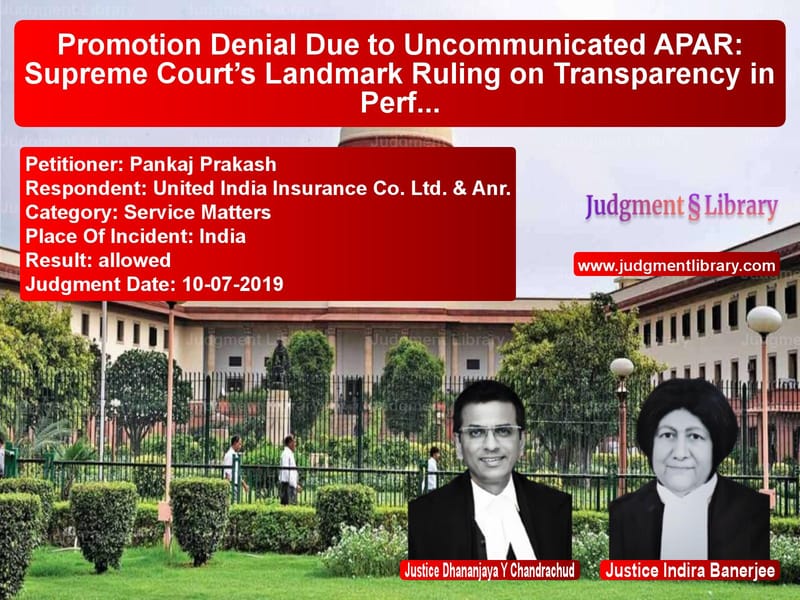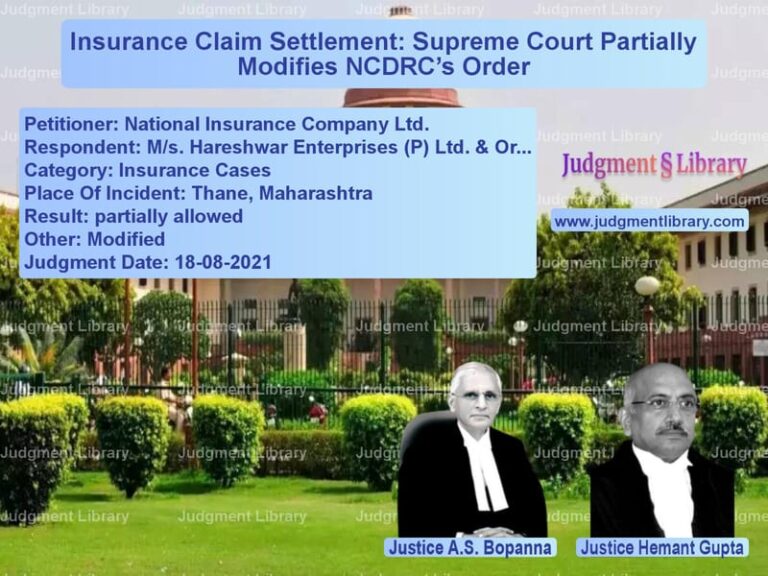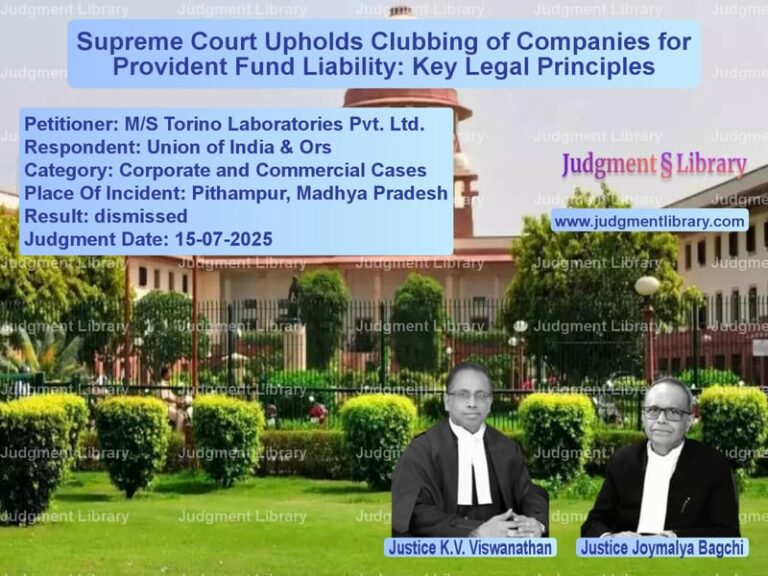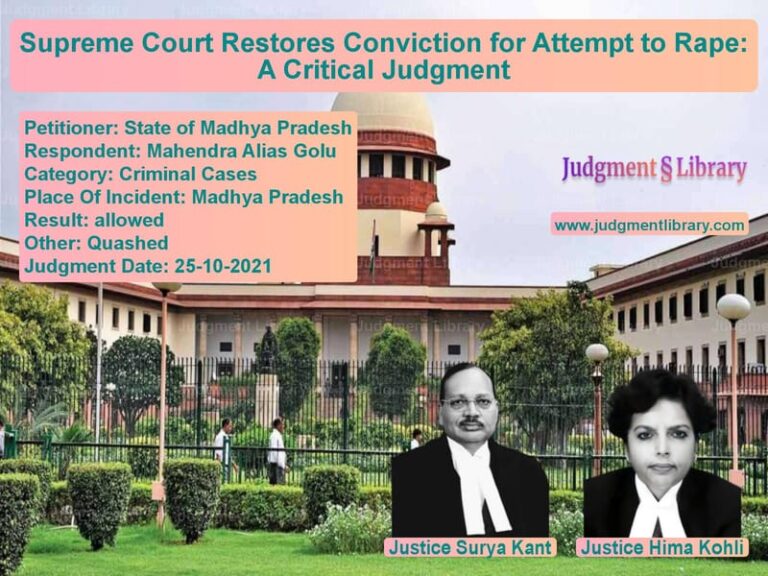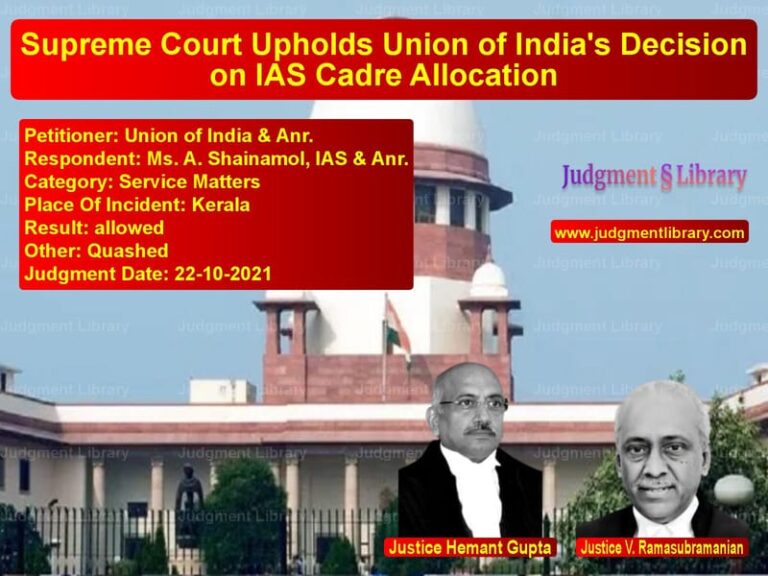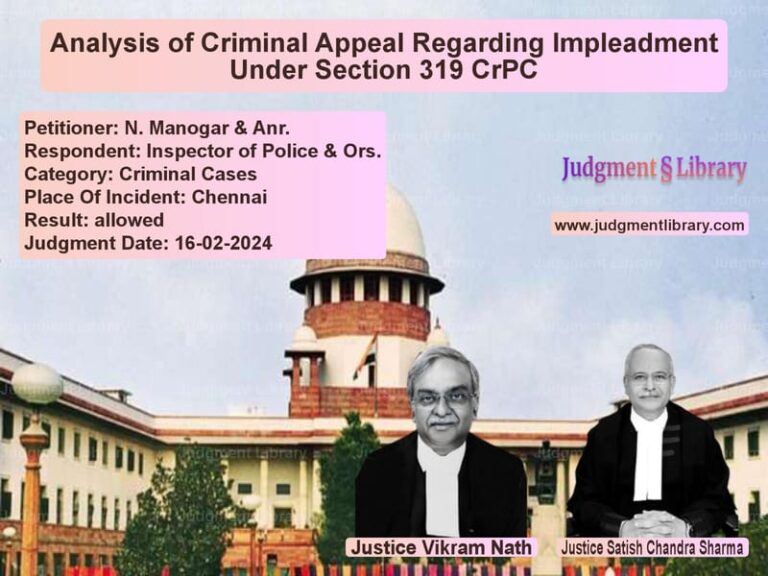Promotion Denial Due to Uncommunicated APAR: Supreme Court’s Landmark Ruling on Transparency in Performance Appraisals
The Supreme Court of India, in a significant ruling in Pankaj Prakash v. United India Insurance Co. Ltd. & Anr., addressed the crucial issue of uncommunicated entries in an employee’s Annual Performance Appraisal Report (APAR) leading to promotion denial. The judgment reaffirmed the principle that all APAR entries must be communicated to employees to ensure fairness in promotional decisions.
Background of the Case
The appellant, Pankaj Prakash, was an officer in United India Insurance Co. Ltd. He sought promotion from Scale III to Scale IV for the year 2014-15. However, he was denied promotion due to lower APAR ratings for the years 2010-11 and 2011-12, which were not disclosed to him at the time.
The appellant’s APAR gradings were as follows:
- 2010-2011: “C”
- 2011-2012: “B”
- 2012-2013: “A”
- 2013-2014: “A”
Since the lower ratings for 2010-11 and 2011-12 were never communicated, he was unable to file any representation against them, adversely impacting his chances of promotion.
Key Issues Before the Supreme Court
- Whether non-communication of APAR entries constitutes a violation of an employee’s right to be heard.
- Whether an employee’s promotional prospects can be affected by uncommunicated entries.
- Whether the company’s compliance with performance appraisal disclosure from 2013-14 onwards excuses earlier omissions.
- Whether the High Court was correct in dismissing the appellant’s writ petition.
Arguments by the Petitioner (Pankaj Prakash)
The petitioner contended:
- Under the precedents set in Dev Dutt v. Union of India (2008) and Sukhdev Singh v. Union of India (2013), every entry in an APAR—whether positive or negative—must be communicated.
- The company’s failure to communicate the ratings deprived him of the opportunity to seek a review.
- Since the Ministry of Personnel had issued Office Memoranda in 2009 and 2010 enforcing APAR transparency, the insurance company was legally bound to follow them.
- As his APAR rating for 2011-12 was lower than subsequent years, its non-disclosure unfairly affected his overall assessment.
Arguments by the Respondents (United India Insurance Co. Ltd.)
The respondent company defended its decision, stating:
- It implemented APAR disclosure from the 2013-14 appraisal year onwards, based on a circular issued on March 18, 2014.
- The appellant’s performance score (64.45) was below the cut-off of 68.98 for promotion.
- APAR ratings were just one component of promotion, which also included a written test, work record, seniority, and an interview.
- As per the Promotion Policy, the appellant’s total score did not qualify him for promotion, regardless of the APAR issue.
Supreme Court’s Judgment
The Supreme Court, in a judgment delivered by Justices D.Y. Chandrachud and Indira Banerjee, ruled in favor of the appellant, holding that:
On the Issue of APAR Transparency
The Court reaffirmed:
“Every entry in the APAR—whether poor, fair, good, or very good—must be communicated within a reasonable period to enable the employee to improve performance or seek a review.”
On the Impact of Non-Disclosure
The Court observed:
“The failure to disclose the APAR ratings for 2010-11 and 2011-12 led to procedural unfairness, as the appellant was deprived of the right to representation.”
On the Insurance Company’s Compliance
The Court held:
“The respondent cannot justify non-disclosure of earlier APARs by citing its compliance from 2013-14 onwards. The obligation to communicate APAR ratings applies retrospectively, in line with judicial precedents.”
On the Relief Granted
The Court ruled:
- The company must disclose the uncommunicated APAR ratings to the appellant within one month.
- The appellant shall have two months to submit a representation.
- The company must review the representation within three months.
- If found justified, appropriate modifications in the appellant’s promotion for 2014-15 must be considered.
Key Takeaways from the Judgment
- APAR transparency is mandatory: Employees must be informed of their performance ratings, irrespective of their promotional impact.
- Employees must have a right to representation: Non-disclosure deprives employees of their right to contest unfair ratings.
- Compliance with disclosure rules must be retrospective: Organizations cannot evade responsibility by citing future compliance.
- Promotional decisions must be based on fair assessments: Hidden ratings must not affect career advancement opportunities.
Conclusion
The Supreme Court’s ruling in this case establishes a crucial precedent for fair employment practices and transparency in performance appraisals. It ensures that employees are not unfairly denied career growth due to undisclosed performance ratings. The judgment serves as a strong reminder to organizations that procedural fairness in promotions is not just a formality but a fundamental right.
Petitioner Name: Pankaj Prakash.Respondent Name: United India Insurance Co. Ltd. & Anr..Judgment By: Justice Dhananjaya Y Chandrachud, Justice Indira Banerjee.Place Of Incident: India.Judgment Date: 10-07-2019.
Don’t miss out on the full details! Download the complete judgment in PDF format below and gain valuable insights instantly!
Download Judgment: Pankaj Prakash vs United India Insuran Supreme Court of India Judgment Dated 10-07-2019.pdf
Direct Downlaod Judgment: Direct downlaod this Judgment
See all petitions in Employment Disputes
See all petitions in Promotion Cases
See all petitions in Public Sector Employees
See all petitions in Recruitment Policies
See all petitions in Judgment by Dhananjaya Y Chandrachud
See all petitions in Judgment by Indira Banerjee
See all petitions in allowed
See all petitions in supreme court of India judgments July 2019
See all petitions in 2019 judgments
See all posts in Service Matters Category
See all allowed petitions in Service Matters Category
See all Dismissed petitions in Service Matters Category
See all partially allowed petitions in Service Matters Category

